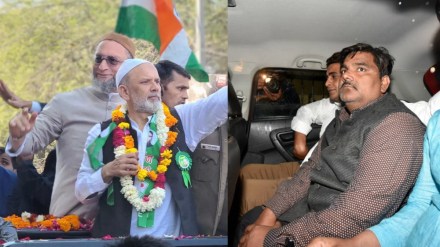The All India Majlis-e-Ittehadul Muslimeen (AIMIM), led by Asaduddin Owaisi, failed to make a significant impact in the 2025 Delhi Assembly elections, with both of its candidates—Tahir Hussain and Shifa-Ur-Rehman—falling short of victory. However, their ability to secure over 30,000 votes despite their controversial past has drawn considerable attention.
Who is Tahir Hussain?
Tahir Hussain, a former Aam Aadmi Party (AAP) councillor, was suspended by the party in 2020 after being accused in multiple cases related to the communal riots that took place in North East Delhi. Hussain had been in jail since then, but the Supreme Court granted him custody parole last month, allowing him to campaign for the elections.
Running as an AIMIM candidate from Mustafabad, Hussain positioned himself as a “victim of injustice” and sharply criticised his former party, AAP. His campaign focused on highlighting what he called biased legal actions against him and other Muslim leaders. Mustafabad, one of the most riot-affected constituencies during the 2020 violence, has a history of political shifts, with the BJP, Congress and AAP all having held the seat in the past three elections.
Despite his legal troubles, Hussain managed to garner significant support, securing over 30,000 votes. His performance in the elections, while not enough to secure a win, underscored the continued political appeal he holds among certain voter segments in the constituency.
Who is Shifa-Ur-Rehman?
Shifa-Ur-Rehman, the other AIMIM candidate, contested from Okhla, a politically charged constituency with a large Muslim voter base. Rehman, a former president of the Jamia Millia Islamia Alumni Association, was also in jail for his alleged role in the 2020 riots and related conspiracy charges. Like Hussain, he was granted custody parole to campaign.
Okhla saw a four-way contest in 2025, with AAP fielding sitting MLA Amanatullah Khan, Congress nominating Ariba Khan (daughter of former Okhla MLA Asif Mohammad Khan), and BJP’s Manish Chaudhary also in the fray. Despite his legal troubles, Rehman’s campaign resonated with a section of voters, helping him secure a substantial vote share, although he ultimately fell short of victory.
What their performance signifies
The strong showing by both AIMIM candidates, despite their legal entanglements, indicates that a section of the electorate resonated with their narratives of being targeted unfairly. AIMIM’s decision to field candidates with controversial pasts was seen as a strategic move to consolidate Muslim votes, particularly in riot-affected areas.
However, the party’s inability to convert this support into electoral victories suggests that while AIMIM may have made inroads into the capital’s political landscape, it still faces challenges in displacing established players like AAP and Congress. The results also reflect the complex nature of identity-based politics in Delhi, where issues of justice, representation, and governance continue to shape electoral choices.
As Delhi’s political dynamics evolve, the performance of Tahir Hussain and Shifa-Ur-Rehman in the 2025 elections raises important questions about voter sentiment, communal politics, and the role of controversial figures in mainstream electoral battles.
